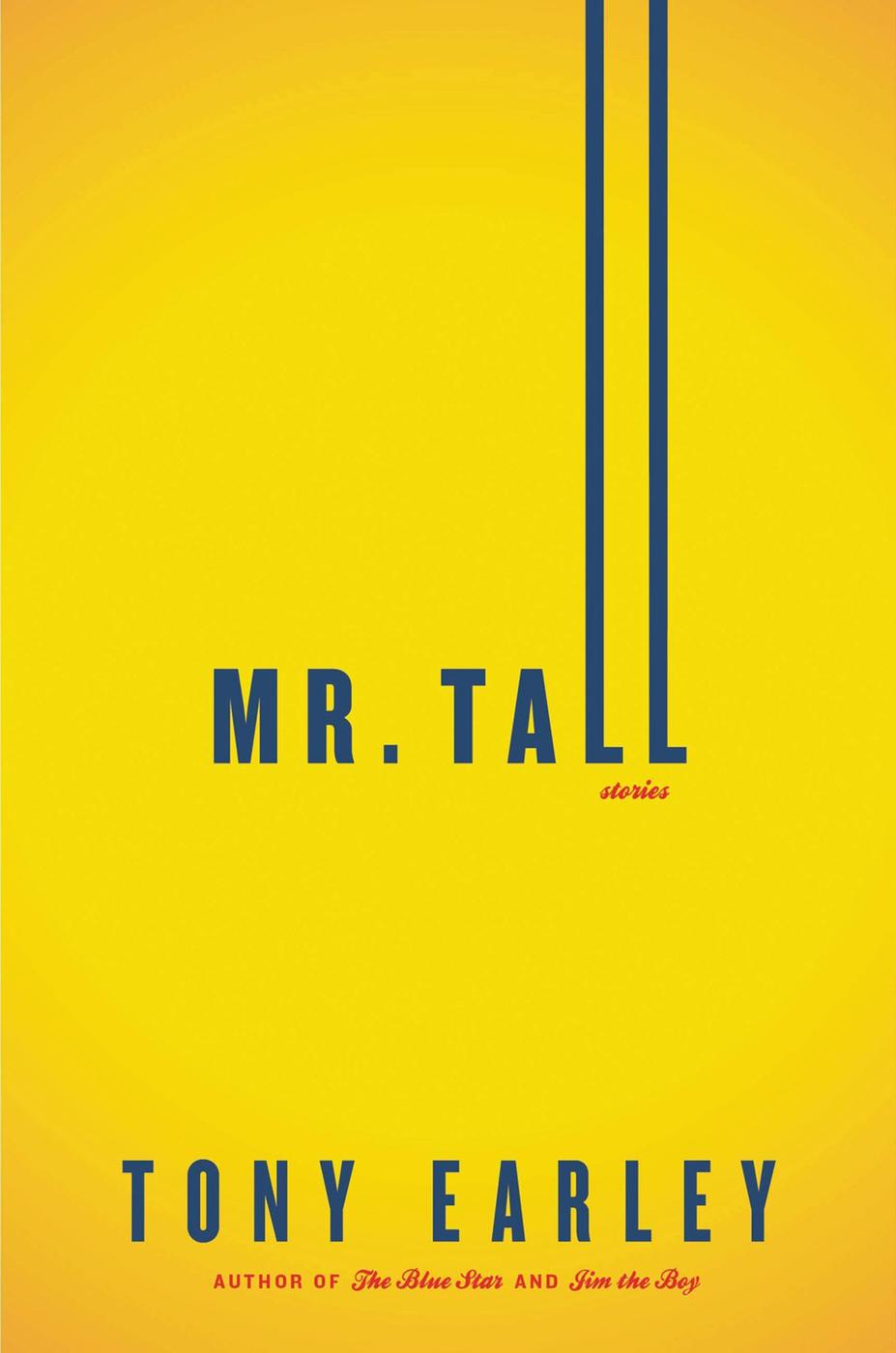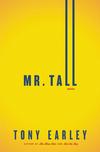Mr. Tall
Authors: Tony Earley




In accordance with the U.S. Copyright Act of 1976, the scanning, uploading, and electronic sharing of any part of this book without the permission of the publisher constitute unlawful piracy and theft of the author's intellectual property. If you would like to use material from the book (other than for review purposes), prior written permission must be obtained by contacting the publisher at [email protected]. Thank you for your support of the author's rights.
For the blue house girls
“What luck did ye have this time, Jack?”
“Why, King, I didn't see no unicorn.”
Richard Chase,
The Jack Tales
Â
I
N OCTOBER DARRYL AND CHERYL
drove from Argyle, North Carolina, all the way to Wilmington, nearly eight hours, to surprise their daughter, Misti, who was a freshman at UNCW, on her nineteenth birthday. They found her locked in her dorm roomâdressed, but flushed and disheveledâwith a scrawny wannabe surfer named Kyle. Kyle wore temporarily indecent board shorts and a T-shirt with “F**K**U” printed across the front. His hair looked casually windblown, an illusion spoiled by the mousse holding it in place. By the time he took hold of Darryl's thumb and said, “'Sup, dude,” Darryl hated him thoroughly. He wanted to yank Kyle's horny, pimpled little heart out of his chest and shake it at him before cramming it down his throat. Instead he said, “Nice asterisks, Slick.” (Darryl had randomly selected “Slick” from a list of diminutions that included “Buddy,” “Chief,” and “Sport.”) Kyle blinked and let go of Darryl's thumb. He either didn't know what an asterisk was, or couldn't believe that Misti's dad had just called him “Slick.” Misti looked panic-stricken, and tried to catch Kyle's eye. Cheryl touched Darryl's arm and said, “Darryl.” Somewhere on the floor a door slammed. Kyle said, “Yo, Mist. I'll check you later,” and didn't look again at any of them. Darryl said, “What's your hurry, Chief?” Then they took Misti out to supper.
Along a four-lane strip of car dealerships, big-box stores, and Mexican groceries, Misti picked a seafood place ringed by a moat of empty parking spaces. Its only virtue seemed to be that it was a long way from campus. “Sweetie, I was hoping that maybe we could go someplace nice, on the water,” Cheryl said. (She idealized the ocean the way mountain people often do: she said she never got tired of looking at it, but had never looked at it long enough to know if that statement was actually true.)
“You can't get into those places on Friday nights unless you have a reservation,” Misti said. “And I gather you didn't make a reservation.”
Her phone beeped and she tapped out a long text message while Darryl and Cheryl gnawed on breadsticks and watched. She snapped the phone shut and propped it carefully against the napkin dispenser, where she glanced at it every few seconds.
“Who was that?” Cheryl asked, pleasantly enough, trying to make conversation.
“Oh, that was just my
friend,
” Misti said, almost biting off the
f.
“You know.
Slick.
”
Darryl excused himself and went to the restroom, where he confronted and killed a truculent tidewater cockroach. He thought about leaving the carcass on the floor for the next diner to see, but calling Kyle both “Slick” and “Chief” had depleted his limited reservoir of vindictiveness. So he picked it up with a wad of toilet paper and commended it to the deep.
They had Misti back in her room by eight thirty. She said she was going out for her birthday with her friends and had to get ready. Darryl wanted to ask her just what, exactly, “going out” meantâturning nineteen in North Carolina didn't make you legal to go anyplace Darryl would've considered “out”âbut he kept his mouth shut. Back at the hotel, Cheryl halfheartedly suggested they order a dirty movie, but Darryl instead watched a documentary about the haunted castles of Ireland until Cheryl fell asleep beside him on the bed.
The next morning Misti agreed to accompany them to brunch (strip mall, pancakes, no view of the water) but the whole time she glared at them from beneath the tunneled visor of a baseball cap. They wanted to take her somewhere fun for the day (the beach? the aquarium? had she seen the USS
North Carolina
yet?) but she said she had to study for a lab on Monday and then gave them a perfunctory wave from behind the glass doors of her dormitory. Darryl hadn't slept well the night beforeâhe had dreamed he was trapped inside a haunted castle in Irelandâand said he didn't feel like driving all the way back home. Cheryl suggested they head up the coast, take their time, see the Outer Banks. Though both of them had lived in North Carolina all their lives, neither of them had ever been to the Outer Banks. Nags Head was so far away from Argyle and so hard to get to that it might as well have been in Ireland. They sat in the car and looked at a map.
“What do those little red dots mean?” Darryl asked. He needed new bifocals and couldn't read the print.
Cheryl squinted. “Ferries,” she said. “They mean you have to take ferries.”
Darryl scratched his head. He didn't know anything about ferries.
“Oh, come on, College Boy,” Cheryl said. “I'll drive the car onto the damn boats if you don't want to.”
Darryl started the engine.
They had barely cleared Wrightsville Beach when Cheryl began to cry. Darryl wanted to cry, too, but he was driving the car. He felt like he had woken up to discover that someone had cut out a vital organ while he slept; inside his chest ached a black wound where his little girl had used to live. Sure, he and Cheryl had suffered when they dropped Misti off at school in August, but that day Misti had clung to them and sobbed and said going to school so far away was a huge mistake, she was so sorry, she didn't want to be a marine biologist anyway and could she
please
go back home with them. They had held her and stroked her hair and whispered, shh, shh, oh Sweetie, don't cry, everything's going to be
fine,
you're going to love it down here, just you wait, you've always been good at science. And even though they had left Misti standing in the dorm parking lot with her hands clamped over her mouth (and they both had fallen apart the second Misti was out of sight) she had still been theirs. Now, suddenly, she wasn'tâor at least it felt that way. In her room Misti had looked at Kyle the same way she had looked at Darryl when, as a toddler, she hadn't been able to get toilet training quite right. He and Cheryl had never said one cross word to Misti about the accidentsânot even when she smeared poop all the way down the Playland slide at McDonald'sâbut she had been terrified of disappointing them anyway. Now she didn't want to disappoint
Kyle.
Kyle was 130 pounds of unoriginal persona and indiscriminate sperm cells, and Misti had known himâwhatâa month? Darryl had loved Misti her whole life.
That day they made it only as far as Morehead City. (Nags Head, they discovered, is hard to get to even when you start in Wilmington.) They turned off the highway and started toward Atlantic Beach to look for a room, but the maze of T-shirt stores and miniature-golf courses and go-kart tracks disheartened them before they reached the ocean. They returned to the highway and checked into a squat, modern, misnamed bunker of a motel called the Swashbuckler's Galleon. Darryl flipped the TV to the haunted castle channel (that night it was England) while Cheryl took a shower. When Cheryl's shower stretched past ten minutes, Darryl knew that she would come out of the bathroom wrapped in a towel, her teeth brushed, her hair smelling of strawberries, expecting him to have sex with her. Sex was how Cheryl dealt with stress and crisis. She said that nothing cleared the fog out of her brain better than a good orgasm. (Not that she thought there was any other kind.) But Darryl didn't want to swab out Cheryl's brain. He resented her expecting him to. He wasn't on call. He didn't do command performances. He had problems of his own. Touching Cheryl was the last thing he wanted to do. In fact, he might never touch her again. A small, unvoiced part of him had always been a little appalled by sex with Cherylâthe low-rent lack of reserve; the hirsute, musky ripeness of her body; the searchlight nipples, the porn-star exhortations and curses. Sometimes she was simply too
much.
All the swashbucklers in the galleon would have been able to hear her when the fog started to break.
Darryl hopped off the bed and hurried down to the deserted pool before she got out of the shower. He sat in a damp deck chair and listened to the filter hum and glumly swatted no-see-ums. Eventually he saw Cheryl pull back the curtain of their room and look around until she spotted him. She was still wearing a towel. Darryl shook his head. Cheryl watched him a moment, then flipped him the bird. He flipped her one back. He gave her time to put on a nightgown and calm down, then went back to the room, which luckily had two beds.
 Â
Darryl and Cheryl had met when Darryl started work at the
Argus,
then a somnolent weekly newspaper in a shriveling town. Cheryl set type for the paper, pasted up pages, yelled at the pressmen and carriers, and tenaciously covered the tail end of Mr. Putnam, the paper's owner, editor, and publisher, whom forty-plus years of community journalism had rendered bitter, cynical, and alcoholic. Darryl arrived, fresh out of J-school, having read
All the President's Men
six times, but knowing almost nothing useful. Cheryl, on the other hand, could fix any piece of machinery in the office, and type the court report in less than two hours, and once laid out a twenty-four-page Wednesday-before-Thanksgiving paper while simultaneously arranging to bond one of her brothers out of jail. She had a mouth on her like a pirate's parrot and wantonly called Mr. Putnam “Mr. Puddin'” when nobody else in Argyle would have daredâespecially late on Tuesday nights, when Mr. Putnam, down in his cups, was slow finishing his stories. (“Mr. Puddin'!” she would yell from the back shop. “Get your worthless ass back here and bring me some copy!”) She called Darryl “College Boy” and treated him like dirt until, as a result of a months-long, near-constant state of panic, he became proficient enough to at least not slow things down. Once Darryl achieved a nominal level of competence, Mr. Putnam drank more and came in less, which left Darryl and Cheryl to put out the
Argus
largely by themselves. During slow times they worked sixty-hour weeks. Other timesâsay, if the Little League playoffs fell during property reevaluations, or something big caught fire during a murder trialâthey hardly ever went home. Darryl drove all over western North Carolina covering high school basketball games, singing “The Star-Spangled Banner” to keep himself awake.
 Â
They of course didn't have reservations for the Cedar Island ferry, and, even though the traffic at the terminal seemed light, the woman selling tickets still made them wait until the last minute in the don't-you-people-know-you're-supposed-to-call-ahead line before she brusquely waved them on board. The deckhands directing traffic weren't glad to see them, eitherâthey obviously didn't think hauling tourists back and forth was an adventure, even if the tourists didâand performed their jobs, Darryl thought, with an attitude falling somewhere between boredom and contempt. Cheryl didn't seem to notice. She was fascinated by the disreputable-looking gang of seagulls flapping along behind the boat. She bought a bag of potato chips to toss to them, an act which, in a matter of seconds, magically summoned seagulls from all over eastern North Carolina.
“You shouldn't do that,” Darryl said. “Feed the seagulls.”
“Why not?”
“Because they're nasty. They'll mess up the cars.”
“So what? It's just bird poop. It'll wash off the next time it rains.”
“Well, maybe these people don't want bird poop on their cars.”
Cheryl snorted. “Then they don't have enough to worry about.” She stared hard at Darryl. “And you don't, either.” She ate a few potato chips. “I'm going to the front of the boat,” she said.
“Bow,” Darryl said.
“No,” she said. “
You
bow.”
 Â
Darryl had been at the paper maybe a year and a half when, without understanding why, and to some degree against his will, he began to hover in Cheryl's vicinity whenever he was in the office. Probably, he told himself, it was because the only other single female he ever got to talk to was the sixteen-year-old scorekeeper for the Argyle High Lady Scots, and her father was a deputy sheriff. He tried to stay away from Cheryl (she had recently divorced a big-armed heavy-equipment operator named, scarily enough, Donnie Payne), but gradually his resolve disintegrated and he spiraled into a progressively closer orbit. He caught himself trying to smell her shampoo. He tried not to stare at her breasts, but they possessed dark powers and tracked him around the room wherever he went. (Cheryl wore tank tops so tight he could see the flowers embossed in the lace of her brassieres.) She tolerated his hanging around as long as he never, ever laid a finger on her scissors.
Without thinking about it much, they began pasting up single pages in tandem, their arms occasionally touching as they worked. Some nights, the paper done, they stretched out on the maroon shag carpeting in Mr. Putnam's office and drank beer and talked about their families (his father was an Episcopal priest, her brothers grew marijuana in the national forest) until they both dozed off. Late one Tuesday, just as they were about to finish laying out the jump page, Darryl closed his eyes and leaned over and stuck his nose in Cheryl's hair. She stood very still for a moment, then carefully laid her scissors down on the light table. She said, “College Boy, what the hell,” and reached up under her tank top and unhooked her bra.
 Â
On Ocracoke Island Darryl wondered why anyone had ever thought that settling on such a provisional scrap of land was a good idea. It was beautiful, sureâsea oats and sand dunes, just like the postcardsâbut in one place he could actually see the ocean on one side of the road and Pamlico Sound on the other. The Lost Colony probably hadn't gotten lost at all; more than likely it just fell in.
Cape Hatteras seemed only marginally more substantial. Darryl knew that as a good North Carolinian he was supposed to experience something resembling patriotism when they visited the lighthouse (the nation's tallest brick lighthouse!) but what he felt mostly was vertigo. He negotiated the spiral staircase without looking particularly ridiculous by staying away from the railing, but once they reached the observation deckâa catwalk, reallyâhe could make himself move only a few terrifying steps away from the door. While they were climbing the stairs, the sun had dimmed behind a thin gray scrim of cloud. Small wraiths of mist hurtled no more than a hundred feet above their heads toward the mainland. Darryl had to keep his back pressed against the wall to avoid being sucked into the void. A bemused park ranger moved over and made room for him.